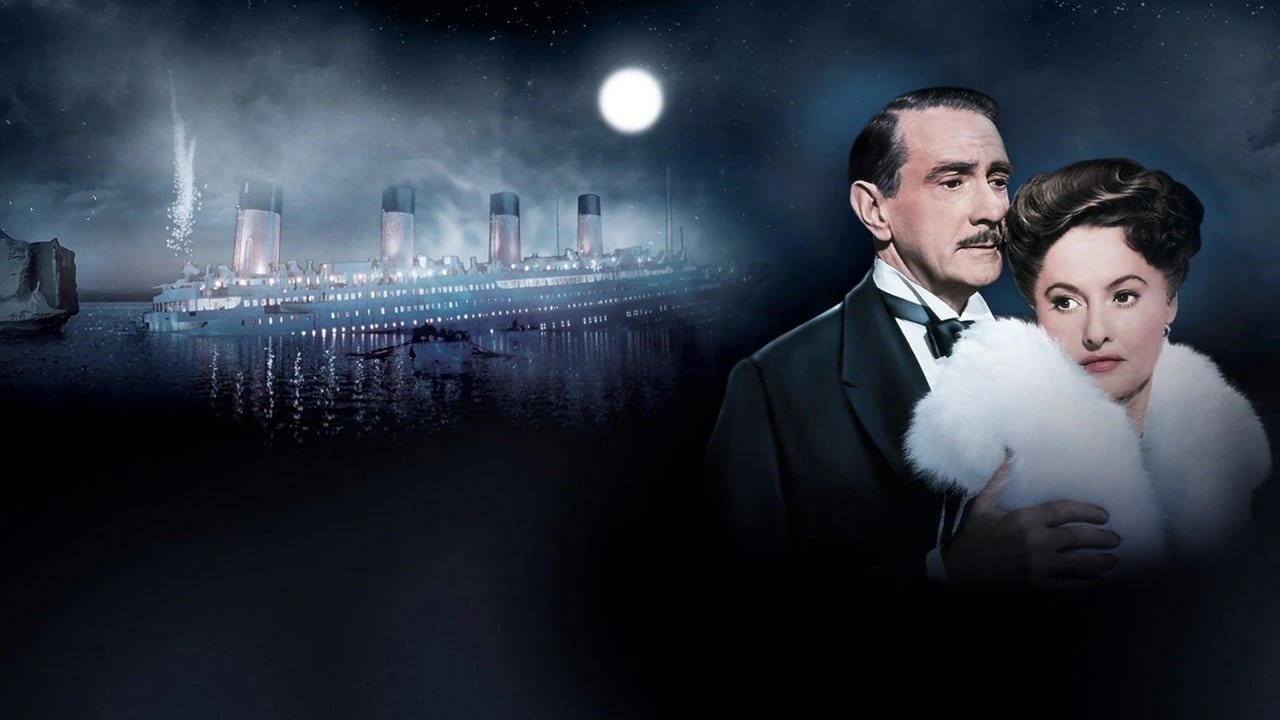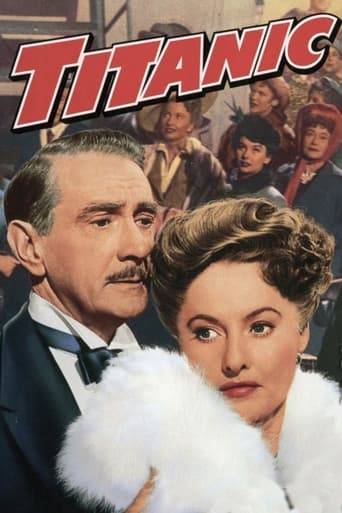

One of the three big Titanic films made over the years, alongside A NIGHT TO REMEMBER and James Cameron's TITANIC. TITANIC (1953) loses points for being more than a little dated. Instead of focusing on the nitty-gritty details of the famous disaster, for much of the running time TITANIC is content to offer turgid melodrama and worst of all, romance. It's hardly gripping stuff.The viewer is required to wait a full two thirds of the running time before we get on with the disaster itself. When it finally takes place, it's admittedly exciting, shocking, and moving as you could hope for, but it's that first hour which really tests the patience. The likes of Clifton Webb, Barbara Stanwyck, and Robert Wagner are fine actors, but you're not watching to see the husband and wife bickering or to watch the young guy fall in love. You're here for the disaster, and everything else feels like a distraction. This is why A NIGHT TO REMEMBER remains my all-time favourite retelling of the Titanic story.
... View MoreI saw this when I was very young but it always stayed with me. Though the story has been told many times and the movie remade several times, this edition sticks with me as the best as the characters and cast are unbeatable. The Stanwyck / Webb duo is one of the best match-ups a film could ask for. The special effects are surprisingly good for its time and this, combined with a good storyline make it my favorite rendition of this sad tale. We see a very young Robert Wagner and the ever brash Thelma Ritter as vital supporting characters. Though the James Cameron version got more hype with some better graphics, our 1953 films far surpasses it for story and character substance. It's a winner all around.
... View MoreNot everything that's made about the Titanic needs to be or even should be looked at in relation to the James Cameron film of 1997. However, realistically speaking, the 97 film was such a blockbuster that it's probably impossible not to do some comparison whenever you watch any story about the Titanic. This was the Cameron film's namesake - 1953's "Titanic." It's the third movie account of the sinking of the ship that I've seen - along with the Cameron film and 1958's "A Night To Remember" - and it's actually, as far as I know, the earliest film version made. The '58 version was very bare bones and to the point - it was quite a contrast to '97 and it worked very well, probably at least in part because of that. This '53 movie is more obviously what impacted James Cameron more. It uses much of the same technique of weaving fictional story lines among the passengers around the historical event of the sinking. Not surprisingly, it isn't as ornate as Cameron's version, and the actual mechanics of the ship's sinking is inaccurate, but when this was made no one knew that the ship had broken in half. Some of the historical names are changed. In this version, for example, there's no Molly Brown, although there's a Molly Brown-like character, played by Thelma Ritter.Most of the melodramatic content revolves around the Sturges family. Fed up with her posh life in Europe, Julia Sturges (played by Barbara Stanwyck) is leaving her husband and taking her children to America to start a new life. Her husband Richard (Clifton Webb) manages to get on board the ship to convince his children to go back to Europe with him. His wife he couldn't care less about. That was a reasonably well developed storyline.Some of the historical details seem inaccurate as well, although the basics are covered. There's no one from the White Star Lines, though, on board, pushing Captain Smith (Brian Aherne) to increase speed, and the strict polarization between first class and steerage doesn't seem as strict as it should be. This is a far shorter movie than Cameron's, and as it approaches the end the emotion does build, especially as Richard finds his son Norman, who suggests that they can "make a swim of it" together. The actual sinking - long and drawn out in '97 - happens fairly suddenly in this, and the movie ends, I thought, rather too abruptly, with no attention to the survivors afterward and their rescue.I saw this movie many years ago and was impressed with it. It's still quite good, and it has an obviously very impressive cast. People will inevitably compare it to James Cameron's movie. That's all a matter of personal taste I suppose. I liked both - and I liked "A Night To Remember" as well. To be honest, though, I'd probably rank this one as #3 out of those 3 - but #3 out of 3 very good movies. (7/10)
... View MoreThe special effects are lacking compared to the superior, more finely detailed A NIGHT TO REMEMBER, but it's the snappy dialogue and superb performances by Stanwyck, Webb and Thelma Ritter that keep this soap- opera-at-sea afloat. Story-wise, it's superior to James Cameron's version. Stanwyck is Julia Sturges, a socialite wife on the lam from her controlling husband Richard, played to prissy perfection by Clifton Webb. She has decided to take their children, Annette and Norman (the Liz Taylor clone Audrey Dalton and an uncredited Harper Carter) back to America, as she has grown weary of the international social circuit she has married into. Richard follows her, but can only get a third class ticket (one of the films many inaccuracies), and sneaks into first class to force Julia's hand and bring his family back to Europe, where he can hopefully marry his daughter off to a titled nobleman. He manages to convince his daughter to return with him once the ship docks in New York, but before he can do the same with his son, Julia has a "high trump" that she plays to chilling effect, that will change all of their lives forever. Of course, the ship sinks before the chips can fall, but I like how the tension builds toward that moment in their cabin before they head down to the captain's table for dinner. Stanwyck plays it for all that its worth as only she can – bitter, world-weary and sad. Thelma Ritter is Maud Young, a character clearly based on the real-life Molly Brown who sailed onboard the real ship. She's a loud, brassy, slightly vulgar delight as she challenges the male passengers to a marathon poker game that only ends when the ship makes that infamous rendezvous with a certain iceberg. Also sailing with them is Robert Wagner as Giff Rogers, a healthy corn-fed All-American college student who falls for Annette. Brian Aherne is a rather dapper Captain Smith, Edmund Purdom (a Fox contract player best known for THE Egyptian) is the Second Officer Lightoller. Director Jean Negulesco maintains a proper amount of drama, humor and tension, but the screenplay by Frances Hackett and Albert Goodrich, despite its snarky dialogue, plays fast and loose with the facts of the disaster in the name of those aforementioned elements.
... View More